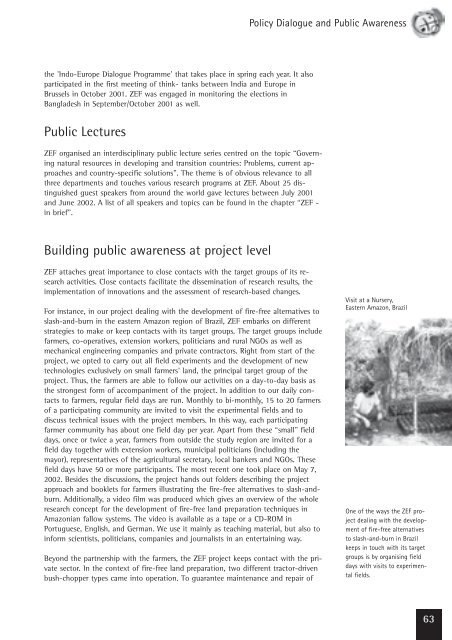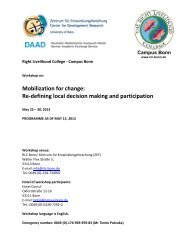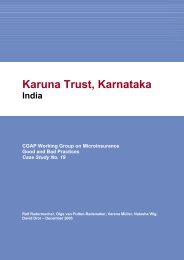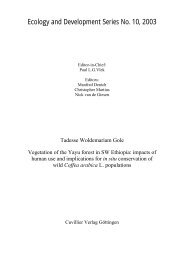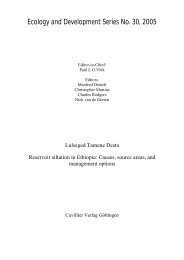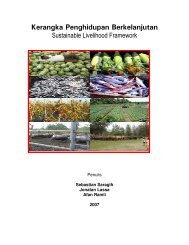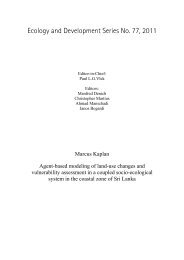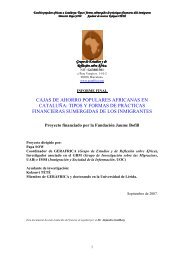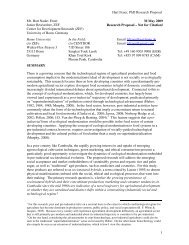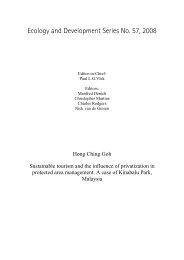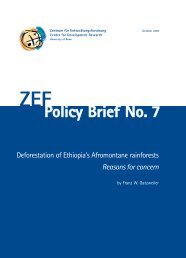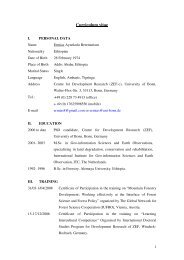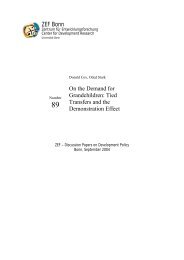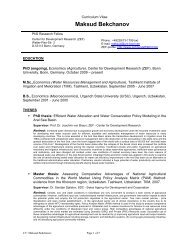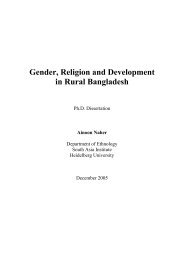ZEF Bonn
ZEF Bonn
ZEF Bonn
You also want an ePaper? Increase the reach of your titles
YUMPU automatically turns print PDFs into web optimized ePapers that Google loves.
the 'Indo-Europe Dialogue Programme' that takes place in spring each year. It also<br />
participated in the first meeting of think- tanks between India and Europe in<br />
Brussels in October 2001. <strong>ZEF</strong> was engaged in monitoring the elections in<br />
Bangladesh in September/October 2001 as well.<br />
Public Lectures<br />
<strong>ZEF</strong> organised an interdisciplinary public lecture series centred on the topic “Governing<br />
natural resources in developing and transition countries: Problems, current approaches<br />
and country-specific solutions". The theme is of obvious relevance to all<br />
three departments and touches various research programs at <strong>ZEF</strong>. About 25 distinguished<br />
guest speakers from around the world gave lectures between July 2001<br />
and June 2002. A list of all speakers and topics can be found in the chapter “<strong>ZEF</strong> -<br />
in brief".<br />
Building public awareness at project level<br />
<strong>ZEF</strong> attaches great importance to close contacts with the target groups of its research<br />
activities. Close contacts facilitate the dissemination of research results, the<br />
implementation of innovations and the assessment of research-based changes.<br />
For instance, in our project dealing with the development of fire-free alternatives to<br />
slash-and-burn in the eastern Amazon region of Brazil, <strong>ZEF</strong> embarks on different<br />
strategies to make or keep contacts with its target groups. The target groups include<br />
farmers, co-operatives, extension workers, politicians and rural NGOs as well as<br />
mechanical engineering companies and private contractors. Right from start of the<br />
project, we opted to carry out all field experiments and the development of new<br />
technologies exclusively on small farmers' land, the principal target group of the<br />
project. Thus, the farmers are able to follow our activities on a day-to-day basis as<br />
the strongest form of accompaniment of the project. In addition to our daily contacts<br />
to farmers, regular field days are run. Monthly to bi-monthly, 15 to 20 farmers<br />
of a participating community are invited to visit the experimental fields and to<br />
discuss technical issues with the project members. In this way, each participating<br />
farmer community has about one field day per year. Apart from these “small" field<br />
days, once or twice a year, farmers from outside the study region are invited for a<br />
field day together with extension workers, municipal politicians (including the<br />
mayor), representatives of the agricultural secretary, local bankers and NGOs. These<br />
field days have 50 or more participants. The most recent one took place on May 7,<br />
2002. Besides the discussions, the project hands out folders describing the project<br />
approach and booklets for farmers illustrating the fire-free alternatives to slash-andburn.<br />
Additionally, a video film was produced which gives an overview of the whole<br />
research concept for the development of fire-free land preparation techniques in<br />
Amazonian fallow systems. The video is available as a tape or a CD-ROM in<br />
Portuguese, English, and German. We use it mainly as teaching material, but also to<br />
inform scientists, politicians, companies and journalists in an entertaining way.<br />
Beyond the partnership with the farmers, the <strong>ZEF</strong> project keeps contact with the private<br />
sector. In the context of fire-free land preparation, two different tractor-driven<br />
bush-chopper types came into operation. To guarantee maintenance and repair of<br />
Policy Dialogue and Public Awareness<br />
Visit at a Nursery,<br />
Eastern Amazon, Brazil<br />
One of the ways the <strong>ZEF</strong> project<br />
dealing with the development<br />
of fire-free alternatives<br />
to slash-and-burn in Brazil<br />
keeps in touch with its target<br />
groups is by organising field<br />
days with visits to experimental<br />
fields.<br />
63


